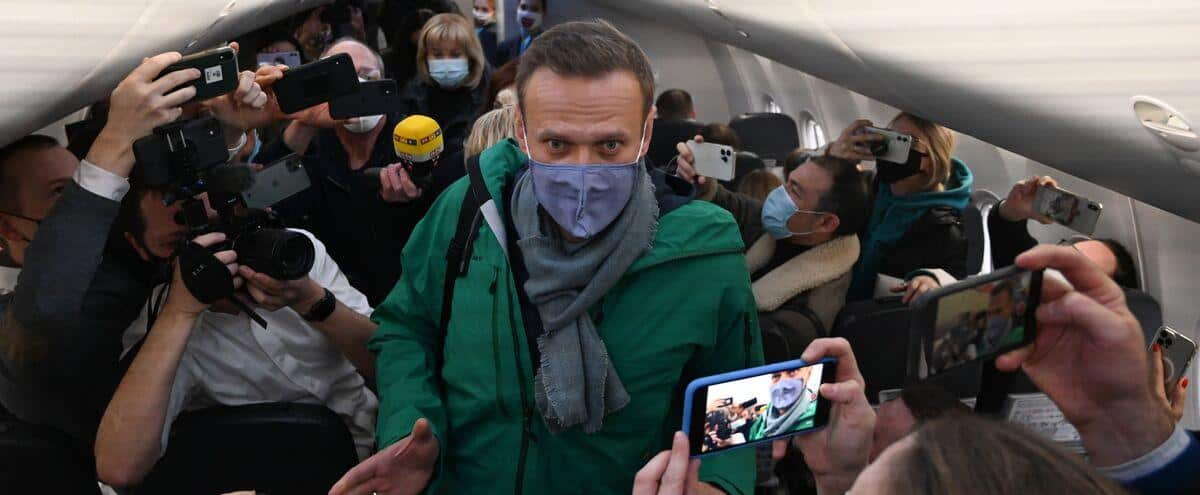Moscow, Russia | On Tuesday, the Kremlin rejected Western demands for the release of his rival Alexei Navalny, who has been imprisoned since his return to Russia. He warned his supporters, who are planning to demonstrate, when he is called this week in Russia.
The 44-year-old anti-corruption activist was arrested Sunday upon his return from Germany, where he was recovering from his suspected poisoning in August, for which Vladimir Putin holds responsibility, despite repeated denials by the authorities.
And the main Western powers called for his “immediate” release. Moreover, they are asking Moscow to clarify its position on these charges of poisoning and to investigate this assassination attempt.
Kremlin spokesman Dmitry Peskov told a news conference on Tuesday that Moscow “does not intend to heed” Western calls for the release of the opponent.
“It is a completely internal matter and we will not allow anyone to interfere in it,” he added.
Alexei Navalny was imprisoned until at least February 15 as part of a measure to violate judicial oversight and was detained in Moscow, in quarantine, due to the coronavirus epidemic.
Immediately after the announcement of the prison, the opposition and his supporters called for demonstrations on Saturday 23 January throughout the country.
A Kremlin spokesman ruled out that such calls and gatherings may amount to “illegal activities.”
Any demonstration requires approval from the authorities in Russia. In addition, in a large part of the territory, including Moscow, mass gatherings are prohibited due to the epidemic.
Leonid Volkov, the opponent’s right-hand man, indicated that no permission request would be made, as the Russians had a “constitutional right” to demonstrate.
Gatherings are planned in many cities, from Moscow and Saint Petersburg in the west, to Khabarovsk in the Far East via Yekaterinburg in the Ural Mountains.
Unauthorized opposition demonstrations often lead to brutal repression and numerous arrests.
The risk of arrests
On Monday evening, at least 73 people were arrested during impromptu support work, according to the specialist NGO OVD-Info.
On Telegram, political scientist Tatiana Stanovata estimated that the announced demonstrations “may not be very significant in terms of numbers, but they will be visible and will not fade quickly.”
Mr Navalny has always been in the crosshairs of the Russian authorities. He rose to fame with opinion polls published on the Internet about the corruption of Vladimir Putin’s elites and his entourage.
However, its notoriety is still limited outside the most important urban centers and among the less connected generations.
Politically, before his poisoning, he was also preparing for an active campaign for the legislative elections in September 2021, against the backdrop of the erosion of the Kremlin’s popularity, United Russia.
Three European laboratories concluded that the opponent was poisoned with a military nerve agent from Novichok, developed in the Soviet era.
Moscow rejected these findings and denounced the plot, claiming that its scientists had not found any poison in the opponent’s body.
Since his return to Russia, Mr. Navalny has been threatened with legal action that could lead to several years in prison.
He is due to stand trial on Wednesday for defaming a World War II veteran.
He is accused of spreading “false” and “insulting” information regarding this veteran, who expressed on television his support for the summer constitutional referendum that strengthens the powers of President Vladimir Putin.
But above all, he has another major judicial appointment. On February 2, the court will consider revoking the adjournment the opponent was sentenced to, paving the way for the possibility that he will be serving part of his three-and-a-half-year prison sentence, which he was convicted in 2014.
Alexei Navalny has also been targeted since the end of December through an investigation for “widespread fraud”, a crime that carries a 10-year prison sentence.
These issues are considered political.
He has been detained since Monday evening in the center of Matroskaya Tishina, a famous prison in Moscow, where the oligarch who became a staunch enemy of the Kremlin, Mikhail Khodorkovsky, was imprisoned.

“Extreme twitteraholic. Passionate travel nerd. Hardcore zombie trailblazer. Web fanatic. Evil bacon geek.”


